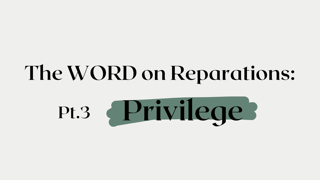Privilege. I am a white, Protestant, able-bodied male. I have the emotional and financial support of both my parents and I’ve never really had to worry about money (because of my parents’ hard work and success). I am privileged. In fact, my parents worked every day of their lives to give me this privilege. They grew up without much of the privilege I have, and it was their goal to give me a life that was easier than theirs. They succeeded.
When people hear that they are privileged, they tend to cringe. I’ve never understood this. To me, saying I am privileged is no different than saying that I’m from West Virginia — it’s a part of who I am and have always been. It doesn’t mean that I am any worse than my peers or that my story is any less valid or valuable than my peers. It just means that my story has not been affected by the same forces that affect some of my peers.
When I go for a walk, I don’t worry about being accosted. I don’t look at men on the street or subway and worry if they’re going to attack me. I don’t worry whether I’m in a neighborhood whose residents wouldn’t want me to be there. When I see a cop, I don’t worry about whether or not they’re going to approach me to question why I’m there. When I go to a restaurant (which I’m able to do), I don’t have to worry about whether I’ll be able to pay the bill. I know I’m not going to be in an incredible amount of debt after getting out of both college and law school, because my parents are supporting me. This allows me to start my professional career without the burdens of heavy debt or the interaction with violence. All of these things make me privileged.
My privilege also assures me that I belong everywhere. In movies, books, radio programming, TV shows, games, advertisements, politics, classrooms, and more — I have always seen people that look and act like me. Growing up, I saw cis white males saving the world or leading the meeting, over and over and over again — enforcing a belief that being a cis white male meant that I was supposed to save the world or lead the meetings. It filled me with privilege.
My privilege doesn’t negate the struggles that I and my parents have gone through in our lives. It just means that I don’t have the additional burdens that others have had. Many of my peers of color have likely lived lives that seem like they exist in a different universe than mine did. Many of them have likely lived their lives with many more instances of fear, sadness, or defeat as a result of the forces of bigotry that exist in our world. Many of their parents had to work much harder to provide them the same opportunities that my parents have provided me. Opportunities for improvement and success were not as easy to attain for them as they were for me. Indeed, their life has been riddled with obstacles while mine has been laden with opportunities.
Reparations are not intended to combat this privilege, but to give some amount of privilege to those who have been systematically denied privilege for centuries. I support reparations because the people that created the institutions that give me privilege are the same people that created the institutions that oppress my peers today. I support reparations because people shouldn’t start life with a heavy burden, simply because of the sins of the past. I’m willing to help bear the burden created by my ancestors — are you?
Will Wasson is a 3L at the Law School. He graduated from West Virginia Wesleyan College in 2018 with a bachelor’s degree in history and political science and a minor in gender studies. He is currently an appointed member of the Student Bar Association, a Member of the Student Assembly Ad-Hoc Committee on Reparations, and the Symposium Editor for the Bill of Rights Journal. Email Will at wawasson@email.wm.edu.

